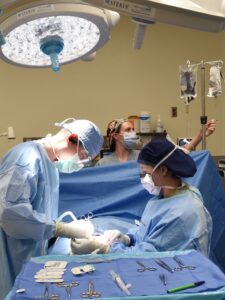
Story by Gino Mattorano
Colorado Military Health System
Colorado Springs veterans now have more surgical care options thanks to a new initiative between the Floyd K. Lindstrom VA Medical Clinic and two Colorado Springs Military Medical Treatment Facilities.
General surgeons from Evans Army Community Hospital at Fort Carson and the 10th Medical Group at the U.S. Air Force Academy are now seeing patients at the Lindstrom Clinic and when medically indicated, performing surgeries on VA patients at their respective facilities.
Appointments for Veterans are available with an active referral from their VA Primary Care Provider, according to Army Col. Eric Ahnfeldt, Chief of Surgery at Evans Army Community Hospital.
Ahnfeldt, along with Air Force Lt. Col. Michelle Buehner, a General Surgeon at the U.S. Air Force Academy’s 10th Medical Group and surgical services lead for the Colorado Military Health System), are part of an overall collaboration effort between Colorado military medical treatment facilities and the VA Eastern Colorado Health Care System to maximize available resources while continuing to provide safe, high-quality healthcare to both VA and military health system patients, according to Ahnfeldt.
Having the option to receive surgical care at a military medical treatment facility, gives Veterans more options and gives military surgeons the opportunity to treat complex cases they might not typically see at a military facility.
“The military service members we see at the MTF are generally younger and don’t have as many health problems,” Ahnfeldt said. “Our VA patients are often more clinically complex and that gives us the opportunity to perform surgeries on a wider range of cases, which helps keep us ready for the types of surgical cases we might see in combat.”
Buehner says that it’s not just the surgeons who benefits from the sharing agreement.
“The whole Operating Room staff and support team benefits from being able to see these patients,” Buehner said. “Our nurses, the technicians, the anesthesiologist – the entire team benefits from being able to take care of our veterans.”
Typical surgeries performed on VA patients include hernia, gallbladder, and more advanced upper digestive system surgeries like reflux and hiatal hernias. VA patients also generate more oncologic surgeries for tumors, colon cancer, skin cancers, etc., according to Ahnfeldt. In addition, the surgical sharing agreement gives VA patients access to Evans’ state-of-the-art robotic surgery capabilities and its Bariatric Surgery Center of Excellence.
As part of the program, military surgeons like Ahnfeldt and Buehner work closely with the VA to be credentialed to work in their facilities, and ensure they comply with all VA and DoD standards of care.
“Programs like this receive a lot of oversight,” Ahnfeldt said. There are a lot of people who care deeply about this program and the entire team is committed to ensuring we provide safe, high-quality care to both our VA and DoD patients.”
Another advantage to Veterans receiving treatment in a DoD facility, is a 20% cost reduction of the total TRICARE Reimbursement Rate paid by the government. In fiscal year 2024, there were 316 VA to DoD referrals across 5 specialties at Evans and the 10th MDG (174 Urology, 86 General Surgery, 53 Cardiology, 2 Nuclear Medicine and 1 Orthopedics). Those surgeries were processed with subsequent encounters and surgical cases completed, saving the government approximately $400K in FY 2024 alone.
Buehner says that VA patients are often surprised to learn they can receive care at a DoD healthcare facility.
“It’s always the Veteran’s choice,” Buehner said. “They can go to the VA Regional Medical Center in Aurora, or they can choose civilian community care, or they can come to a DoD facility and see us.”
Buehner says she really enjoys being able to take care of VA patients.
“I have really great days when I go to the Lindstrom clinic and get to meet and hang out with them while providing care,” Buehner said. “They have such a great sense of humor and are just such good people. I really enjoy taking care of them and their families.”
Ahnfeldt agrees.
“Many of our nation’s Veterans don’t have a lot of interaction with the military after they have completed their service,” Ahnfeldt said. “I think they like being seen at a DoD facility because it makes them feel more connected to the military again. This program gives them another option to receive great care in our facilities, and I think it makes them feel like they’re still part of the team. And the added benefit is that this program helps our military team maintain its wartime readiness. It’s a win-win for everyone.”
The surgical sharing program is just one of several ways the VA Healthcare System in Colorado and the Colorado Military Health System are working together to utilize and expand services that improve access and capacity to medical care for VA patients. In the past year, this partnership has opened access to DoD’s General Surgery, Ophthalmology, and Urology, with limited Cardiology and Nuclear Medicine studies (based on available capacity) for VA beneficiaries.